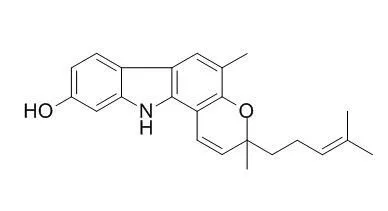Hypermethylation of the promoter of the tumor suppressor gene RASSF1A silences its expression and has been found to be associated with advanced grade prostatic tumors. The DNA methyltransferase (DNMT) family of enzymes are known to be involved in the epigenetic silencing of gene expression, including RASSF1A, and are often overexpressed in prostate cancer.
METHODS AND RESULTS:
The present study demonstrates how Mahanine, a plant-derived carbazole alkaloid, restores RASSF1A expression by down-regulating specific members of the DNMT family of proteins in prostate cancer cells. Using methylation-specific PCR we establish that Mahanine restores the expression of RASSF1A by inducing the demethylation of its promoter in prostate cancer cells. Furthermore, we show that Mahanine treatment induces the degradation of DNMT1 and DNMT3B, but not DNMT3A, via the ubiquitin-proteasome pathway; an effect which is rescued in the presence of a proteasome inhibitor, MG132. The inactivation of Akt by wortmannin, a PI3K inhibitor, results in a similar down-regulation in the levels DNMT1 and DNMT3B. Mahanine treatment results in a decline in phospho-Akt levels and a disruption in the interaction of Akt with DNMT1 and DNMT3B. Conversely, the exogenous expression of constitutively active Akt inhibits the ability of Mahanine to down-regulate these DNMTs, suggesting that the degradation of DNMT1 and DNMT3B by Mahanine occurs via Akt inactivation.
CONCLUSIONS:
Taken together, we show that Mahanine treatment induces the proteasomal degradation of DNMT1 and DNMT3B via the inactivation of Akt, which facilitates the demethylation of the RASSF1A promoter and restores its expression in prostate cancer cells. Therefore, Mahanine could be a potential therapeutic agent for advanced prostate cancer in men when RASSF1A expression is silenced. |






 Cell. 2018 Jan 11;172(1-2):249-261.e12. doi: 10.1016/j.cell.2017.12.019.IF=36.216(2019)
Cell. 2018 Jan 11;172(1-2):249-261.e12. doi: 10.1016/j.cell.2017.12.019.IF=36.216(2019) Cell Metab. 2020 Mar 3;31(3):534-548.e5. doi: 10.1016/j.cmet.2020.01.002.IF=22.415(2019)
Cell Metab. 2020 Mar 3;31(3):534-548.e5. doi: 10.1016/j.cmet.2020.01.002.IF=22.415(2019) Mol Cell. 2017 Nov 16;68(4):673-685.e6. doi: 10.1016/j.molcel.2017.10.022.IF=14.548(2019)
Mol Cell. 2017 Nov 16;68(4):673-685.e6. doi: 10.1016/j.molcel.2017.10.022.IF=14.548(2019)